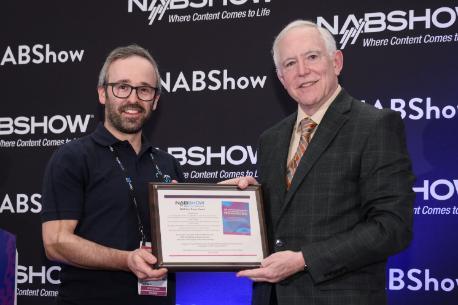
A private pop-up 5G network designed by Scottish engineers to beam live footage of the coronation of King Charles III and the Queen across the globe, has won two prestigious industry awards.
The potentially game-changing technology reduces the reliance on fixed wire connections between camera crews and outside broadcast vehicles, and the team included engineers from the University of Strathclyde’s Software Defined Radio team (StrathSDR) and spin out company Neutral Wireless, in collaboration with the BBC and other key partners.
A research paper detailing how the private network was deployed along The Mall, a project that drew on years of collaborative work and demonstrated the viability of 5G technology for media production, won the Best Paper Award at the 2024 NAB Broadcast Engineering and Information Technology (BEIT) Conference in Las Vegas on April 13. The conference event showcases new trends, ideas, products, and services, driving innovation in content creation and distribution and runs in parallel with the NAB Show.
Historic event
Lead author, Dr Samuel Yoffe from the University of Strathclyde’s Department of Electronic and Electrical Engineering, said:
It was an amazing opportunity to play a part in such a historical event, and it was a real collaborative effort.
“To have our paper detailing the design, development and delivery of such an ambitious project recognised by the NAB and BEITC with a best paper award is fantastic, and we are hugely grateful to the organisers and panel."

The project, which delivered the world’s largest temporary private 5G standalone network to connect cameras, for the worldwide broadcast of the historic event on May 6 last year, also won an IABM Broadcast and Media award for best project, collaboration, event or other innovation award. The awards, also recognised at the NAB show, celebrate outstanding technological innovations.
The judges noted: “This project demonstrated the very best in technical collaboration and problem solving to meet the needs of broadcasters to solve a very real problem around access to reliable spectrum and bandwidth for important events.
“The detailed planning and proof-of-concept work was a great foundation for the live use of the technology in a real environment … a future pathway to a very agile approach in deploying non-public networks for events such as this.”
Uncontested coverage
The network was used by 20 leading broadcasters, including the BBC, CBS, Sky and CNN. Eight 5G cells were set up along The Mall, providing reliable and uncontested coverage from Buckingham Palace to Admiralty Arch. It delivered 1 Gigabit per second (Gbps) of wireless connectivity, carrying high definition (HD) video from wireless cameras to production facilities around the world.
The kit was deployed after successful network testing in Loch Lomond-side at the Scotland 5G Centre supported Wave 1 Rural testbed earlier in 2023.
Professor Bob Stewart, head of the University’s Software-defined Radio team, said: “Spectrum sharing has come of age in the last two years and solutions like the Neutral Wireless private 5G networks for media and broadcast mean that, from local community events to professional sports, there are new options to be streamed live using wireless 5G technology.”